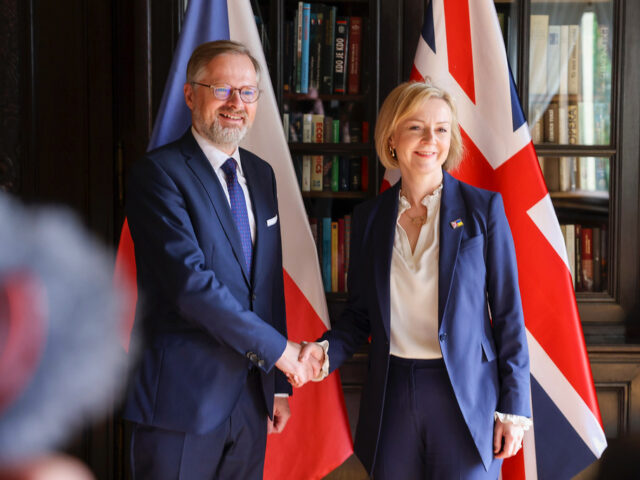Prime Minister Liz Truss has been warned to “tread carefully” by Brexit leader Nigel Farage, as she travels to Prague to attend the opening meeting of the newly formed ‘European Political Community’.
Just two-and-a-half years after the United Kingdom formally left the European Union, Prime Minister Liz Truss, who was a prominent campaigner to remain in the bloc during the 2016 EU Referendum, travelled on Thursday to the Czechia capital of Prague to attend the inaugural summit of a new international European body.
The brainchild of French President Emmanuel Macron, the European Political Community was first proposed in May, following his re-election in April. The French leader pushed the idea of yet another European institution as a means of incorporating non-EU states into the political conversation. Some have said it is essentially giving a means for states such as Ukraine to join a European body while they seek actual membership in the European Union.
Writing in the Times of London ahead of her trip, Liz Truss attempted to downplay the idea that the UK was signing up to a pseudo-European Union, saying: “Today’s meeting is not an EU construct or an EU alternative. I am very clear about that. It brings together governments from across Europe, around a third of whom are outside the EU.”
“A post-Brexit Britain, as an independent country outside the EU, should be involved in discussions that affect the entire continent and all of us here at home. We are taking part as an independent sovereign nation, and we will act as one.”
Former Remainer Truss, who claims to have had a Damascene conversion to the cause of national sovereignty after the referendum, continued by explaining that “Brexit was never about the UK stepping away from our proud and historic role as a leading nation in the region and beyond. We always believed we would find new ways of working that reflected our shared values and interests.”
Expressing doubt over the commitment from the former Lib-Dem to stand firm on the Brexit cause, Nigel Farage responded to Truss’s writing, saying: “Isn’t this what we were told the EEC (European Economic Community) was in the 1970s? Liz Truss had better tread carefully.”
The European Economic Community, which was established in the Treaty of Rome in 1957, was initially formed in order to merely facilitate economic cooperation throughout Europe, however, it later would become one of the so-called “three pillars” that would form the European Union in 1993. The United Kingdom joined the EEC in 1973, following the signing of the Treaty of Accession on January 22nd 1972 under the direction of then Conservative Party PM Ted Heath, without putting the measure before the voting public.
Truss has not only agreed to join the new Macron-led institution, but has even gone so far as to offer the next meeting of the European group in London. In addition to Brexit Britain, other non-EU states include Albania, Armenia, Azerbaijan, Iceland, the Republic of North Macedonia, Moldova, Montenegro, Norway, Serbia, Switzerland, Turkey and Ukraine. However, demonstrating the close links to the European Union, the heads of both the European Council and the European Commission, Charles Michel and Ursula von der Leyen were also invited to the meeting.
The need for such an institution is questionable, particularly for Britain, as it still belongs to several international bodies through which it can coordinate with its European allies, including the G7, NATO, and the Council of Europe.
The UK’s continued membership in the Council of Europe has come with some controversy, with the European Court of Human Rights (ECHR) a subsidiary of the body, intervened to override Britain’s Supreme Court and block the removal of several illegal migrants to an asylum processing site in Rwanda in June. With the government set on continuing the Rwanda scheme for illegals, it is likely that further showdowns with the European court will be in the offing.
The fact that Truss has been so keen on propping up Macron’s new body may belie the precarious position that Britain finds itself heading into the winter months, with the PM expected to beseech European leaders to help “keep the lights on” during the winter months the UK amid the energy crisis, with decades of mismanagement and persual of the green agenda leaving the country beholden to its European neighbours to meet its energy demands.
Truss will call on the European leaders to keep the gas and electricity connections that flow between Great Britain and Continental Europe to remain open during the winter, however, with Europe facing shortages itself, it remains to be seen how much the fate of Britons will be on the minds of leaders in far off European capitals.
“The UK sends and receives both gas and electricity through the undersea cables and pipelines that link us with neighbours like France, Belgium and the Netherlands. Today we must all commit to keeping those connections open this winter so we keep the lights on across the continent,” she wrote.
The embattled PM is also seeking to come to some agreement with France on the issue of illegal migration, with over 30,000 aliens landing on British beaches after crossing the English Channel from France this year, alone.
“Today we will be deepening our joint working with France, the Netherlands and other countries along the migration route to step up our collective response to this trans-national tragedy,” Truss wrote.
Hitherto, Mr Macron has been happy to unload migrants onto the UK and has so far refused to come to an agreement on the issue of migrant returns.
Follow Kurt Zindulka on Twitter here @KurtZindulka

COMMENTS
Please let us know if you're having issues with commenting.